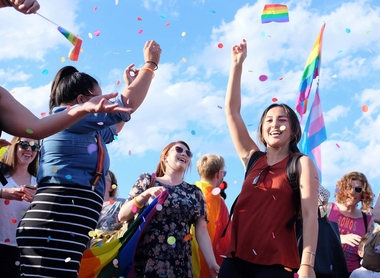Multi-issue LGBT protest targets Trump Hotel, D.C. City Hall

Hundreds of LGBT activists attending the National LGBTQ Task Force’s annual Creating Change conference in D.C. this week rallied and marched from the Trump International Hotel to the John A. Wilson City Hall building Saturday afternoon in a multi-issue protest that included a call to decriminalize sex work.
Organized jointly by the Task Force and the local LGBT group WERK for Peace, participants carried signs in English and Spanish saying “Stop Donald Trump’s Attacks on Freedom, Justice and Equality;” “The Future is Queer” and “Dismantle White Supremacy.”
Firas Nasr, founder and coordinator of WERK for Peace, told the gathering one of the protest’s themes was “intersectionality” in which LGBTQ people stand in solidarity with the concerns and injustices faced by a wide range of minorities, including Muslims, people of color, indigenous people and immigrants.
Related:
Discriminatory "Freedom of Conscience" bill introduced in Oklahoma senate
Justices won't step into Mississippi gay rights legal fight
Supreme Court leaves Nebraska funeral protest law in place
He and other speakers at the protest said their aim also was to focus on two bills currently before the D.C. City Council calling for curtailing sexual harassment on the streets and decriminalization of sex work.
“We are here today to send a clear message to our local and national government that we will not tolerate our bodily autonomy being taken away,” he said. “We are here today to send a clear message that we will not tolerate sexual violence in our community.”
Jessica Raven, executive director of the local group Collective Action for Safe Spaces, said one of the two bills, the Street Harassment Prevention Act, was aimed at educating the public and the community to respect the right of consent, including the right to decline consent, for overtures by someone interested in sex.
The bill, introduced by Councilmember Brianne Nadeau (D-Ward 1), calls, among other things, for the city to “create policies and guidelines to identify and educate District employees about street harassment, to fund programs to support the prevention of street harassment,” and to collect data to determine the “pervasiveness” of street harassment in the city.
The second bill for which the protesters advocated is the Reducing Criminalization to Improve Community Safety and Health Act of 2017,” which was introduced in October by Councilmember David Grosso (I-At-Large). The bill would repeal all current D.C. laws that call for criminal penalties for commercial sex work engaged in by consenting adults. It would cover sex workers and their customers.
The bill explicitly states nonconsensual sex “trafficking” would remain illegal under the bill. Grosso and a coalition of local activists, including LGBT activists that endorsed the bill, said decriminalization would make it easier to prevent sex trafficking and prosecute those who profit from it by eliminating the fear among victims of sex trafficking to come forward and seek help from law enforcement without fear of being arrested for prostitution.
Urvashi Vaid, a longtime LGBT rights advocate and former executive director of the National LGBTQ Task Force, was among a contingent of Task Force supporters and officials, including current executive director Rea Carey, who attended the protest.
“It’s a multi-part protest that’s against the Trump administration,” she said. “It’s against sexual violence and harassment. It’s for sexual freedom.”
Vaid appeared to summarize the sentiment of many of the protesters’ support for the D.C. bill to decriminalize sex work in D.C. when she was asked whether she agreed with the conventional view that such a bill could not pass anytime soon in the nation’s capital.
“Absolutely not,” she said. “We’re in an era where it’s clear that decriminalization is better than criminalization. A few years ago people wouldn’t have seen the reforming of the drug laws like medical marijuana and legalizing that,” she said.
“Similarly, the sex work laws actually are very harmful to LGBT people,” she continued. “They’re used against us on the streets. They overreach. What are they trying to serve or protect? So I don’t think it’s a bridge too far. It’s an issue whose time has come now.”
Information gathered from this article
The Gayly 1/28/2018 @ 10:19 a.m. CST





